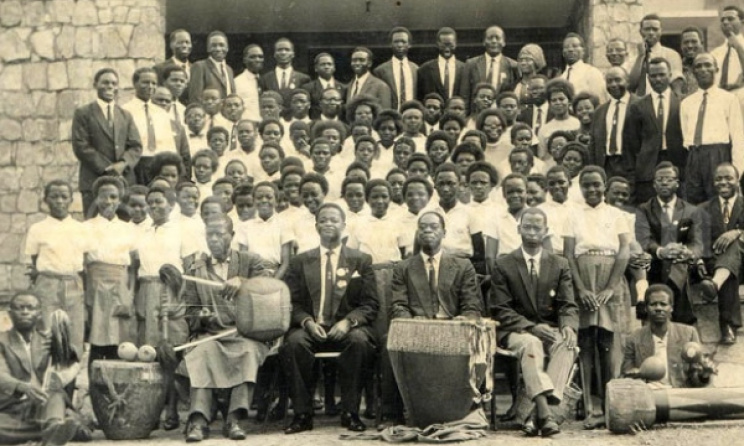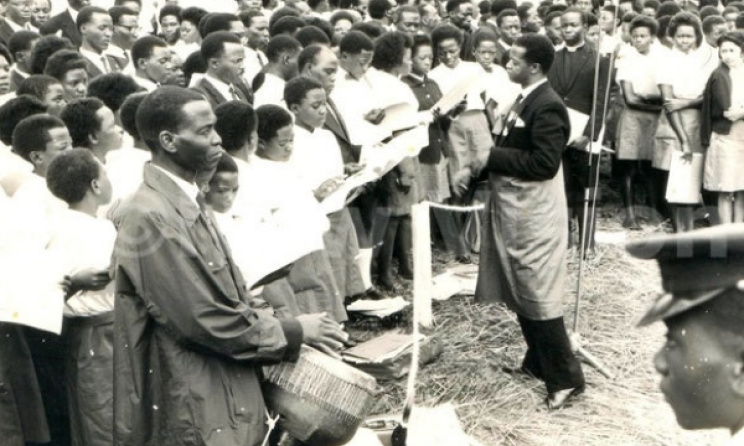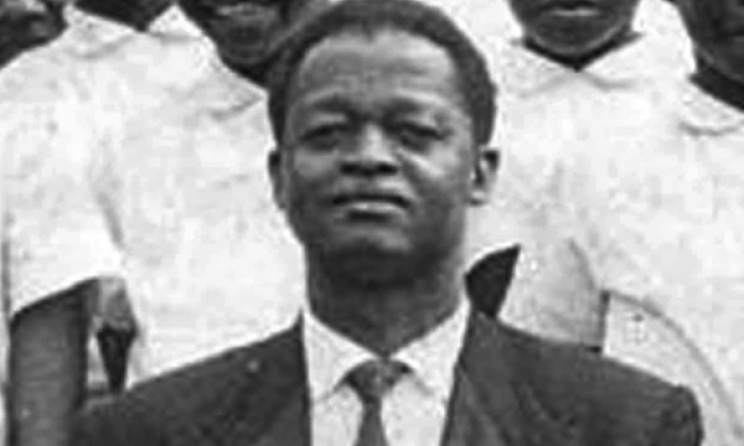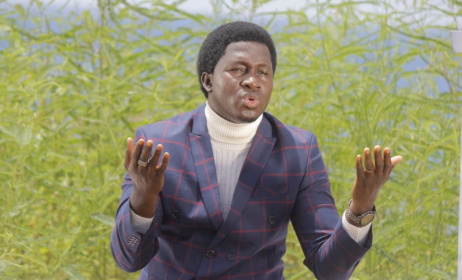Ugandan choir's remarkable journey to the Vatican
News of Pope Francis' upcoming visit to Uganda (as well as Kenya and Central African Republic) between 25 and 30 November 2015 has highlighted a landmark event in the history of African music, which recently celebrated its 51st anniversary, as well as the incredible efforts of a pioneering Ugandan composer. It was during the canonization of the Uganda Martyrs on 18 October 1964 that the Vatican II synod first allowed indigenous music to be peformanced during Catholic worship. In doing so, Uganda became the first country in the world to have its music sung in indigenous languages and accompanied by traditional instruments at St. Peter’s Basilica in the Vatican.
 Joseph Kyagambiddwa's choir that sang in Rome. Photo: www.newvision.co.ug
Joseph Kyagambiddwa's choir that sang in Rome. Photo: www.newvision.co.ug Joseph Kyagambiddwa conducting a choir at Namugongo in the 1960s. Photo: www.newvision.co.ug
Joseph Kyagambiddwa conducting a choir at Namugongo in the 1960s. Photo: www.newvision.co.ug Ugandan composer and educator Joseph Kyagambiddwa. Photo: www.newvision.co.ug
Ugandan composer and educator Joseph Kyagambiddwa. Photo: www.newvision.co.ug
According to a recent article in the New Vision newspaper, the choir sung before over 2 000 prelates. Interestingly, the choir that wowed the Vatican did not all come from Uganda. The church apparently did not have enough money to send and maintain all the members from Uganda, so it was decided the choir be beefed up by other Ugandans who were already living in Italy and nearby European countries (and who could sing, of course). In the end, the choir was comprised of mainly Ugandan students who were studying at various European or American universities and others who were working there.
This choir was led by Joseph Kyagambiddwa, a virtuoso music writer, teacher and choral conductor who not only wrote songs in the traditional Baganda style but also transcribed them into the classical music staff notation. He will always be remembered by his immortal classical musical work, The Uganda Martyrs’ Oratorio, a collection of 22 songs about the Uganda Martyrs. Kyagambiddwa composed the songs in the typical Ganda musical genre, incorporating the infectious sounds of authentic Baganda musical instruments like Ngoma (big drum), Ngalabi (long drum), Ndingidi (tube-fiddle), Endere (flute) and Ensaasi (shakers).
The Martyrs’ Oratorio pieces, some of which were sung at the Vatican, include ‘Karoli Lwanga Wuuno omulwanyi owamaanyi’ (Lwanga the invincible religious warrior), ‘Kizito Omuto ye wange’, (Kizito my younger brother) and ‘Abagalagala b’embuuza and Mulinnya lya Patri’ (In the name of the Father), among others.
Kyagambiddwa’s songs were characterized by sophisticated acoustic effects, including energetic yodels. They were also lavish in their poetry and rhyme. They portrayed the composer's great skill in bringing out the moods and circumstances of his subject matter. Songs like ‘Wa gyendisanga eyantonda’ (where shall I find my creator) are authentically African with jubilant, romantic characteristics owing to their joyous subject matter.
Joseph Kyagambiddwa was born at Kaloddo, Masaka in 1914. He studied at Bukulula Primary School, St. Henry’s College Kitovu and Katigondo National Major Seminary. After Kyagambiddwa left the seminary, Archbishop Dr. Joseph Kiwanuka identified his unique musical talent and sent him to Makerere University to study music. He later secured a scholarship to further his musical studies at the Catholic University of America. On his return, Kyagambiddwa taught music at the then Kyambogo National Teachers College, Nkozi TTC and Busuubizi TTC. Besides composing and teaching music, Kyagambiddwa also wrote educational books like Music from the Source of the Nile.
While the Martyrs Oratorio is his most celebrated work, Kyagambiddwa composed many other hymns of unrivalled beauty. Some have continued to prevail in Uganda's contemporary urban gospel scene, including ‘Ye mmanyi mmanyi nze’ (based on the Apostolic Creed), ‘Ali waggulu eyantonda nnyini buyinza’, ‘Mbuuza abataka b’e Buyudaaya’ and ‘Lwali Lukulu’, a musical dedication to the 'White Fathers', the missionaries who pioneered Catholic evangelism in Uganda.
Despite its beauty, Kyagambiddwa’s music was fiercely resisted by some conservative Catholics, who at the time regarded traditional African music and instruments as sacrilegious and unworthy for Church use. Today, thankfully, indigenous music is highly valued in religious contexts.



























Commentaires
s'identifier or register to post comments